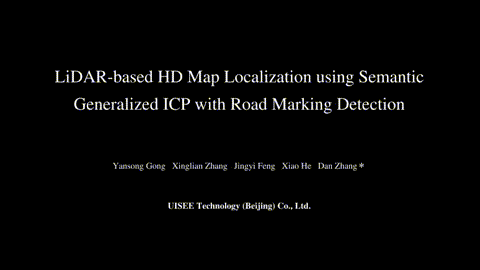LiDAR-based HD Map Localization using Semantic Generalized ICP with Road Marking Detection
Published by IEEE/RSJ International Conference on Intelligent Robots and Systems. (CCF C), 2024
LiDAR-based HD Map Localization using Semantic Generalized ICP with Road Marking Detection
Abstract
In GPS-denied scenarios, a robust environmental perception and localization system becomes crucial for autonomous driving. In this paper, a LiDAR-based online localization system is developed, incorporating road marking detection and registration on a high-definition (HD) map. Within our system, a road marking detection approach is proposed with real-time performance, in which an adaptive segmentation technique is first introduced to isolate high-reflectance points correlated with road markings, enhancing real-time efficiency. Then, a spatio-temporal probabilistic local map is formed by aggregating historical LiDAR scans, providing a dense point cloud. Finally, a LiDAR bird’s-eye view (LiBEV) image is generated, and an instance segmentation network is applied to accurately label the road markings. For road marking registration, a semantic generalized iterative closest point (SG-ICP) algorithm is designed. Linear road markings are modeled as 1-manifolds embedded in 2D space, mitigating the influence of constraints along the linear direction, addressing the under-constrained problem and achieving a higher localization accuracy on HD maps than ICP. Extensive experiments are conducted in real-world scenarios, demonstrating the effectiveness and robustness of our system.

Recommended citation: Y. Gong, X. Zhang, J. Feng, X. He, and D. Zhang, "Adaptive Soft Encoding: A General Unsupervised Feature Aggregation Method for Place Recognition," in 2024 IEEE/RSJ International Conference on Intelligent Robots and Systems. http://wdyiwdwd.github.io/files/lsloc.pdf